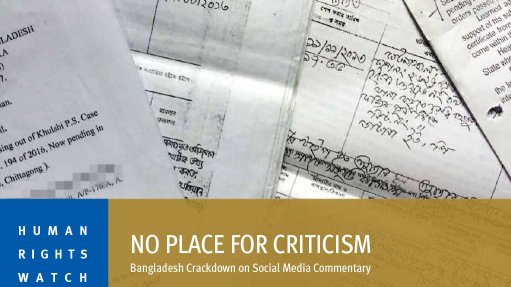
On April 9, 2018, Bangladesh listed its new Digital Security Bill in parliament, which was then sent to a parliamentary standing committee for review. The proposed law is in part intended to replace section 57 of the Information and Communication Technology Act (ICT Act) 2006, which has been widely criticized for restricting freedom of expression and has resulted in scores of arrests since 2013. However, the current draft of the Bill replicates, and even enhances, existing strictures of the ICT Act. This report documents abuses under section 57 of the ICT Act to warn that any new law should protect rights, not be used to crack down on critics.
For instance, exactly a year ago, Monirul Islam, a rubber plantation worker in Srimongol, southern Bangladesh, experienced an unwelcomed surprise. He was arrested on April 13, 2017, accused of defaming the country’s prime minister and harming the image of Bangladesh. His crime: he had “liked” and then “shared" a Facebook post, something social media users around the world do every day. The post, allegedly from a colleague, criticized the ongoing visit by Prime Minister Sheikh Hasina Wazed to India, saying that she was meeting her Indian counterpart, “for the sake of power and to win the coming election.” The post included some cartoons of the prime minister.
He was accused of offences under section 57 of the ICT Act claiming that he, and the publisher of the post, were “opposition supporters” and that the post was an “injustice,” “condemnable,” and a “betrayal to the country.” Denied bail by both the magistrate and district courts, Islam, who denies the offence, was detained for three months before the High Court released him in July 2017. Meanwhile, the author of the original post, reportedly went into hiding fearing his own arrest.
Report by the Human Rights Watch